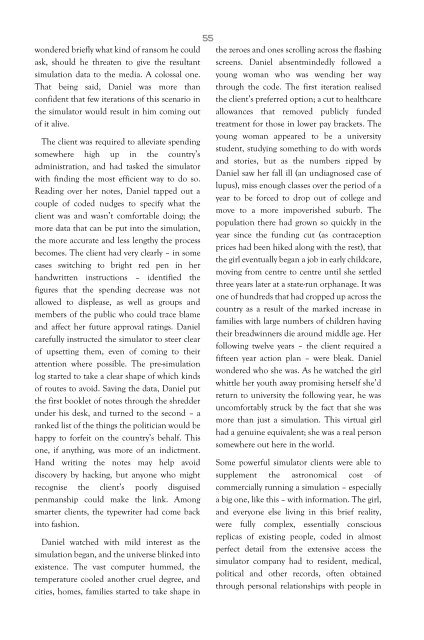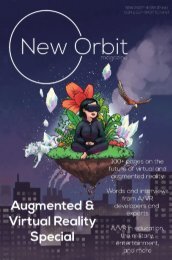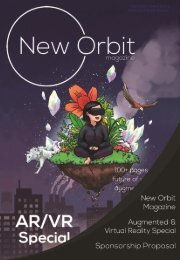Feb 2018 v01 online
((Incomplete formatting))
((Incomplete formatting))
Create successful ePaper yourself
Turn your PDF publications into a flip-book with our unique Google optimized e-Paper software.
wondered briefly what kind of ransom he could<br />
ask, should he threaten to give the resultant<br />
simulation data to the media. A colossal one.<br />
That being said, Daniel was more than<br />
confident that few iterations of this scenario in<br />
the simulator would result in him coming out<br />
of it alive.<br />
The client was required to alleviate spending<br />
somewhere high up in the country’s<br />
administration, and had tasked the simulator<br />
with finding the most efficient way to do so.<br />
Reading over her notes, Daniel tapped out a<br />
couple of coded nudges to specify what the<br />
client was and wasn’t comfortable doing; the<br />
more data that can be put into the simulation,<br />
the more accurate and less lengthy the process<br />
becomes. The client had very clearly – in some<br />
cases switching to bright red pen in her<br />
handwritten instructions – identified the<br />
figures that the spending decrease was not<br />
allowed to displease, as well as groups and<br />
members of the public who could trace blame<br />
and affect her future approval ratings. Daniel<br />
carefully instructed the simulator to steer clear<br />
of upsetting them, even of coming to their<br />
attention where possible. The pre-simulation<br />
log started to take a clear shape of which kinds<br />
of routes to avoid. Saving the data, Daniel put<br />
the first booklet of notes through the shredder<br />
under his desk, and turned to the second – a<br />
ranked list of the things the politician would be<br />
happy to forfeit on the country’s behalf. This<br />
one, if anything, was more of an indictment.<br />
Hand writing the notes may help avoid<br />
discovery by hacking, but anyone who might<br />
recognise the client’s poorly disguised<br />
penmanship could make the link. Among<br />
smarter clients, the typewriter had come back<br />
into fashion.<br />
Daniel watched with mild interest as the<br />
simulation began, and the universe blinked into<br />
existence. The vast computer hummed, the<br />
temperature cooled another cruel degree, and<br />
cities, homes, families started to take shape in<br />
the zeroes and ones scrolling across the flashing<br />
screens. Daniel absentmindedly followed a<br />
young woman who was wending her way<br />
through the code. The first iteration realised<br />
the client’s preferred option; a cut to healthcare<br />
allowances that removed publicly funded<br />
treatment for those in lower pay brackets. The<br />
young woman appeared to be a university<br />
student, studying something to do with words<br />
and stories, but as the numbers zipped by<br />
Daniel saw her fall ill (an undiagnosed case of<br />
lupus), miss enough classes over the period of a<br />
year to be forced to drop out of college and<br />
move to a more impoverished suburb. The<br />
population there had grown so quickly in the<br />
year since the funding cut (as contraception<br />
prices had been hiked along with the rest), that<br />
the girl eventually began a job in early childcare,<br />
moving from centre to centre until she settled<br />
three years later at a state-run orphanage. It was<br />
one of hundreds that had cropped up across the<br />
country as a result of the marked increase in<br />
families with large numbers of children having<br />
their breadwinners die around middle age. Her<br />
following twelve years – the client required a<br />
fifteen year action plan – were bleak. Daniel<br />
wondered who she was. As he watched the girl<br />
whittle her youth away promising herself she’d<br />
return to university the following year, he was<br />
uncomfortably struck by the fact that she was<br />
more than just a simulation. This virtual girl<br />
had a genuine equivalent; she was a real person<br />
somewhere out here in the world.<br />
Some powerful simulator clients were able to<br />
supplement the astronomical cost of<br />
commercially running a simulation – especially<br />
a big one, like this – with information. The girl,<br />
and everyone else living in this brief reality,<br />
were fully complex, essentially conscious<br />
replicas of existing people, coded in almost<br />
perfect detail from the extensive access the<br />
simulator company had to resident, medical,<br />
political and other records, often obtained<br />
through personal relationships with people in










